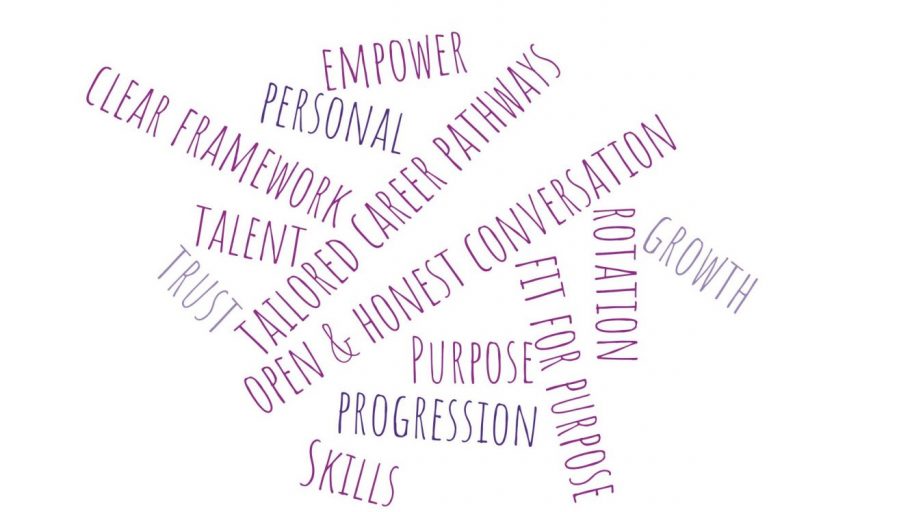My name is Harry Hodgson. I joined BPDTS in September 2019 as a Business Analyst working in the Product Design practice. Before joining, I held roles in project and delivery management; this experience provided a solid foundation in agile ways.
In April of 2020, I decided I wanted to change roles. I’m passionate about people being at their best; while at BPDTS, I wanted to support our team do that. My Digital Service Practice Manager (DSPM) was incredibly supportive of my decision; they acted as coach and a soundboard when frustrations emerged. They also signposted me to different training opportunities that would enable me to become a better manager and leader, eventually leading to me being appointed as a DSPM.

Making career moves
I've now fully transitioned from my role as a Business Analyst in Product Design to a DSPM in the Engineering practice. I currently manage a team of Infrastructure and DevOps Engineers located across several sites, including Leeds, Newcastle, and Manchester.
The Engineering practice welcomed me with open arms. In the new role, I work very closely with 3 other DSPMs, each of whom brings unique experiences to the position. Their support and help in onboarding into a new practice have allowed me to hit the ground running.
What it takes to be a great manager
BPDTS created new DSPM roles to reduce the number of employees being managed by one person. When I saw the posts open, I knew this was the role for me. So, what do I think makes a great DSPM?
Trust
Engaging with my manager and building a relationship based on trust and honest discussions helped me progress my career. Through regular development conversations, I explored different areas of the business. Not only was my manager a great role model, but they also suggested potential mentoring and job shadowing opportunities based on my aspirations and interests.
Communication
Before the intake of new DSPMs, line managers were spread thin managing 40 to 50 people. Creating improved and more frequent interaction with the people I manage tops my list of important things to do. It’s what many people had been missing.
When I stepped into the role, I emphasised the importance of quality communication. I met with each of the team and made myself available for 1:1 sessions. I want my team to feel they can reach out to me if they have any issues or challenges.
Support
Drawing on my experience with my DSPM, I want to be here to support the team as a team and as individuals. I don't want people to feel stressed that they can't ask questions or raise concerns if they have them. At BPDTS, everyone tries to be as accessible as they can; my team know I'm here anytime, in person, on the phone, and by video call.
Feedback
Continuous feedback is essential to development, and it goes both ways. Now that there's been a rebalancing of managers and employees, managers can spend more time engaging in conversations about skills, mobility, development paths, and wellbeing.
No one should feel they're stuck or can't move away from what they're doing now. I'm a great example of someone who took a pivot in their career; I love it. Now I pass on that same great experience to other employees.
Development
BPDTS offers different training opportunities; sometimes, an individual doesn't know what they want to do, or which path to take. Talking about what options they're considering, where they see themselves going, and when they'd like to get there is beneficial.
It's not unusual for people to join an organisation doing one role, and to change positions when they see how the organisation is shaped. Continual Conversations is a platform where people can share and act on the vision in the time spent at BPDTS.
For example, a member of my team has a real passion for security and compliance. The minute they expressed their interest, I introduced them to a mentor with expertise in cybersecurity. Being able to connect them was rewarding for all concerned.
Leadership
DSPMs are also involved in the strategic side of how our business is shaped; we're part of the BPDTS extended leadership community which means we influence the company’s strategic direction and have sight into the people who are delivering against our objectives.
Right now, I'm working on one of the BPDTS business plan objectives focused on strengthening our relationship with the Department for Work and Pensions (DWP). As such, I'm able to tap into skills I’ve developed as a business analyst and taking advantage of the experience I’ve gained on the agency-side too.
Everyone at BPDTS has an opportunity to exercise personal leadership. Participating in work streams to help drive BPDTS business objectives and cultural aims are the flip side of all our roles. So, in addition to the daily management responsibilities, I'm also engaged in more strategic elements through different work streams.
Relationship building – on several fronts
The DSPM role has a lot more depth and breadth than at first glance. I'm managing a group of people providing services to the DWP. Part of my role is to cultivate relationships with my team, to understand where they want to go, and what skills they want to develop.
As my team expands the level of knowledge – either vertically or laterally, they're in a better position to deliver service excellence. But more than that, when an employee feels like they can grow and develop within the company, they're more engaged and satisfied in what they're doing here at BPDTS. The knock-on impact of feeling great about what we do has a direct effect on our customer, the DWP.
More broadly, understanding what my team is doing, how they're interacting within their DWP teams, and getting feedback from their DWP task managers adds context to how we can continue to improve our relationship with the DWP.
Part of my role as a DSPM is to manage employees within BPDTS. I also think of myself as a conduit into the DWP. Through the individuals on my team, their extended teams, and their ecosystem of colleagues, I have a unique perspective. The combination of people management experience and continual conversations add another dimension to the end-to-end service provider relationship we have with the DWP.
People-centric management
The DSPM role is quite exceptional; often, when I've worked in the private sector, I've been managed by a specialist in the space I worked, a project director, head of delivery, or portfolio manager, for example. What's different in BPDTS is I'm not directly related to the roles of the people I'm managing.
As a DSPM, I'm here to support my team's learning and development, training, recognition, wellbeing, and yes, the administrative side involving things like annual leave or pay-related issues. The task managers are the people who are involved in the day to day management; they're on the specialist side of whatever discipline our people are carrying out.
A knowledge-sharing community
When I first arrived at BPDTS, the style and approach each line manager used was significantly varied. The positive experience I had with my DSPM wasn't unique; however, the consistency of that great experience was patchy while BPDTS experienced a growth spurt.
In the last year, the DSPM community has ramped up to create more consistency and transparency across the board, which ultimately makes a better experience for our employees. Wendy Lee, a DSPM in Blackpool, manages our DSPM community; through Wendy's direction, the community has become a valuable resource for bubbling up good practices.
The evolving forum is a community where we can share experiences and formalise some of our processes. For example, we've recently been in a session that focused on how to run a successful 1:1 session with employees.
DSPMs - more than meets the eye
A few people within my project team were baffled as to why I would take a role as a DSPM. Many people think of line managers as someone who looks after the administrative side of people management. What I love about the position at BPDTS is it's so much more than that.

In the role, I'm gaining the experience of managing a good size team and helping people take control of their career. There aren't many organisations where you have the luxury of having a line manager who is there to help you develop personally and professionally. It was through the guidance from my DSPM that I was able to not only move practices but also transition from an individual contributor to a coach and manager.
Now, I can pay it back by being present and available in conversations with employees. I want to create the same fertile ground for my team that I had when I was considering what my next career move would be. Having someone there who acts as an ally and coach is tremendous.
What I'm doing helps improve employee satisfaction and ultimately helps BPDTS retain top talent. DSPMs are sandwiched in between delivery and senior management. So far, it's a model that works well.
Learn more
Stay up to date with what's happening at BPDTS. Sign up for email updates whenever new content gets posted.
Connect with us on LinkedIn, and follow us on Twitter.
Are you thinking of joining us? Please have a look at our current job openings.
Leave a comment